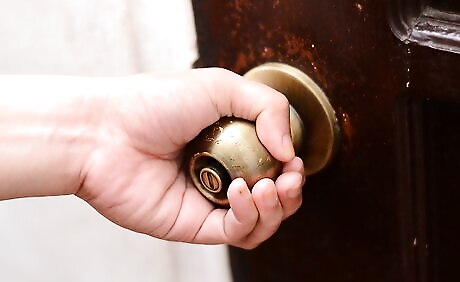
views
Noting Things That Are Out of the Ordinary

Pay attention to changes in the normal routine of your partner. Are they, for instance, coming home from work later than usual on some nights? Sometimes these small changes to a person's routine mean nothing more than life has given them a reason to be unavailable, but they are still something that you want to be aware of.

Decide if you feel they have they become moody suddenly, and eager to start fights. Sometimes, a cheating lover will displace their shame, anger, and guilt onto you by starting a fight, which can then be blamed on you. In short, they need a place to throw off their negative feelings.

Think about whether your partner has stopped talking to you. Did your significant other always have things to say, and has suddenly become distant? Your relationship may be losing intimacy because your lover has started a new one with someone else.

Consider whether your partner smells different when they come near you. Everyone knows this one is stereotypical but it can also be true. If they are coming around smelling like a perfume or aftershave that you don't wear, then they may have been too close to someone who wears it.

Pay attention to changing interests, including music, political views, social issues, favorite books, or movies, etc. When someone spends enough time with someone else, they begin to adopt their views, or at least understand them. If your partner is interested in things that they hated before, perhaps they are being influenced by someone else more than usual.
Checking for Secretiveness

Examine the trust in your relationship. Does your lover allow you to touch, or look through their phone, emails, etc.? If your partner is hiding their phone from you, or deleting all their messages before letting you have it, then there is something they don't want you to see. They may take their phone with them into the restroom or keep it face down on the table. They may not tell you about their whereabouts. They may not introduce you to their friends.

Notice if they leave the room to take calls. If you ask whom called or texted them, do they always tell you "It's nobody?" These are also important signals, which show that your partner has something to hide.

Watch carefully for unwillingness to accept you without notice. Do they become angry when you come over unannounced, or only text you when they are at home, never calling you? These are also signs of betrayal. For some reason, they do not want you at their home at certain times, and they do not want to call you while they are at home.

Pay attention to whether they have to "clean up" before letting you into their house, room, or car. If an earring is lying in the passenger side of their car, or a condom is behind their bed, extra time will probably be taken to dispose of those items.
Listening to What is Said

Notice if a partner is constantly putting someone else down. They may be saying awful things about that person, but pay attention to the fact that they are still talking about them 24/7. They are trying to fool you into believing the person is undesirable, thus throwing the suspicion off them.

Catch them in a lie. Casually ask a partner where they were such and such day, and let them answer. Remember their answer, and ask again a few days later. If they are lying constantly, then they will have a hard time keeping up. They may start to get angry with these simple questions, another big hint.
Noticing the Red Flags

Watch for unexplained bills, receipts for meals, etc. bought for two people. If you keep finding receipts from restaurants with two different meals on it, or two sodas in the cup holders, or a bill for a bracelet you did not get, then watch out.

Find out whether your partner has additional email accounts, or other online accounts. Or begin to, out of nowhere, change their passwords to keep you out of their accounts. Normally, if they didn't give you their password to start with, this is no problem. But if they've suddenly changed it to protect messages they've written, or chats they've had, you should be alert to this possible red flag.

Notice whether their friends are acting differently towards you. Have their friends begun to act oddly around you? When you casually talk to their friends, do they seem anxious, nervous, or eager to leave? They probably know something you don't know.

Notice whether they begin to buy you gifts out of nowhere, or start casually mentioning an end to your relationship. Questions such as "What would you do if we broke up?" are key hints. Anyone can become guilty. This guilt can easily be forgotten with an action or item for the other person that makes the cheater seem selfless.
Asking Your Boyfriend or Girlfriend to Explain

Listen to how your partner explains their behavior. If they voluntarily give you excuses that are detailed and scripted, then they probably are. They have most likely projected your questions, based on their indiscretion, and preemptively created a story to cover it all up. Listen and note any details which are unnecessarily significant to their story (names, times, exact locations, etc.) and keep a mental list.

Notice the response. When they finish telling their story do they shake their head, toss up their hands, or use similar gestures to mimic exhaustion, confusion, and disbelief about their 'crazy evening' or event? Body language is a great indication that they are 'acting'.

Recall one of the details that stuck out to you once the story is finished. Keep it a seemingly harmless detail that won't frighten or alert your partner that you are suspicious (specifics are not what you are looking for). Now ask them an abstract question about the specific detail you picked. Innocently ask when this 'detail' or event happened, or some other simple question. If they are not being truthful, they will give it away during this question.

Pay attention to what happens now. Did they awkwardly get silent or shift before giving you an answer? Did they stutter or become nervous with their words? Did they look like a deer in the headlights? If so, here's why: When someone is telling the truth they don't need to think about the answer for more than a second or two. The details are already there because it truly happened. But, if this person is lying, they will have to stop and mentally go through their story from the beginning. They will need to remember where in the story this question happened and that takes thought processing. Since the 'minor' detail you asked them to provide wasn't prominent when they made up their excuse, they most likely won't have a cut and dry answer.

Do it again with another detail oriented question. Keep watching closely. Can you see them thinking it through again? Are they becoming frustrated and starting to snip at your 'dumb questions' and/or ask, "What does it matter?" If so, this is a stalling technique they use while making up new details. It's also a handy distraction if they point their finger back at you and make you the bad guy for asking in the first place. How often have we heard, "What exactly are you insinuating?"

Expect to be questioned back. Usually your partner will start questioning you and inevitably say, "What? You don't believe me? Do you think I’m lying to you?”.

Wait patiently. Eventually you will hear the sweet words, "What? Do you think I'm cheating on you?!" Bingo!

Ask yourself, did you insinuate that they were hiding something? Did you steer the story in a direction to make room for interrogation then blatantly accuse them of messing around? Did you actually accuse them of anything at all? By asking simple questions your partner not only revealed what kind of behavior they have been hiding, but they also spun their entire story out of whack, no matter how solid they believed it to be, and became overwhelmed. At this point, if you ask them anything, they will probably start to sweat, panic, or lose the capability to accurately recall anything about their story. The discrepancies will flow at this point and soon you will have enough information know if your partner is 'on the level.'




















Comments
0 comment